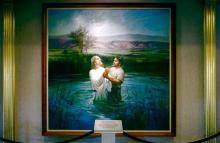Elie Wiesel

Receiving a prestigious human rights prize, an Iraqi lawmaker, who gained international attention for her oppressed Yazidi religious minority, decried the Trump administration’s “unfair” executive order on immigration.

Elie Wiesel’s death is inspiring an outpouring of grief and gratitude from leaders in the religious and political worlds, and ordinary people alike.

The Church of Jesus Christ of Latter-day Saints has apologized for a Mormon who baptized the late parents of famed Nazi-hunter Simon Wiesenthal. But despite calls this week from Holocaust survivor and Nobel laureate Elie Wiesel (and others) to rethink the controversial rite, the church is unlikely to drop it entirely.
Latter-day Saints trace posthumous baptism to the Apostle Paul, who wrote in 1 Corinthians 15:29, "Else what shall they do which are baptized for the dead, if the dead rise not at all? Why are they then baptized for the dead?" Mormons believe that Joseph Smith, their faith's founding prophet, restored the apostolic practice after centuries of neglect by mainstream Christians.
Proxy baptism was also Smith's answer to a classic Christian conundrum: What happens to people who, through no fault of their own, did not join the church during their earthly lifetime? Should they be barred from heaven?
Mormons believe that vicarious baptisms give the deceased, who exist in the afterlife as conscious spirits, a final chance to join the Mormon fold, and thus gain access to the Celestial Kingdom. To Mormons, only members of the LDS priesthood possess the power to baptize.